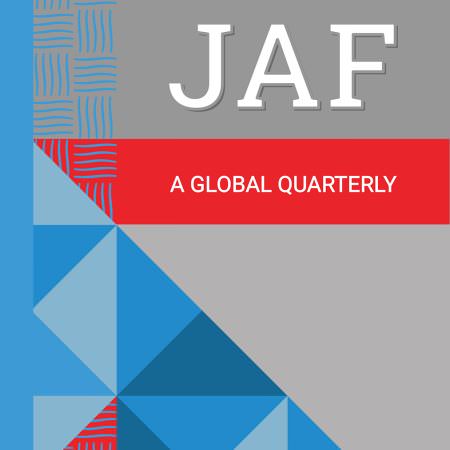Now Available: JAF (Winter 2025) Focuses on Legacies of Harassment and Harm

The Winter 2025 issue (Vol. 138, No. 547) of the Journal of American Folklore (JAF: A Global Quarterly) is now available online and has been mailed to subscribers.
In this issue:
- “Sexual Harassment and Legacy Forum,” a special Perspectives section, challenges JAF’s readership to contemplate explicitly and publicly our responses to the professional legacies of colleagues in our field who are known or alleged to have harmed others through sexual harassment and gender discrimination. An introduction by the forum’s curator Lisa Gilman is followed by 14 essays representing a diversity of viewpoints from members of the American Folklore Society. The forum invites readers to engage in difficult conversations, and recognize the complexities and ambiguities of human behavior, interpersonal relationships, and power dynamics. JAF’s editors invite readers to continue the conversation and strategize how to move forward by submitting written responses in a variety of formats for publication in future issues.
- The article “Cursed Russians and Armed Saints: ‘Angry Folklore’ and the Ethics of Precarity in Response to the 2022 Russian Invasion of Ukraine” tackles related themes of folklore and harm. Co-authors Robert Glenn Howard and Mariya Lesiv analyze what they call “angry folklore” in the digital realm created and spread both by people watching the war in Ukraine from afar and those experiencing it directly. In their conclusion, they state “all researchers should be mindful of the complex ways in which harm can flow in a system of conflict and of the potentially complex and shifting notions of victims vs. perpetrators.”
- The issue also includes an obituary for Mildred L. Rahn and reviews of books of interest to JAF readers.
JAF’s editorial team invites readers to continue this conversation and strategize how to move forward by submitting written responses in a variety of formats for publication in future issues. We also encourage conversations about other difficult topics central to our field and professional community. Contact us at JAF.editors@afsnet.org.
Learn more about how to access JAF.
Contents
Article
Cursed Russians and Armed Saints: “Angry Folklore” and the Ethics of Precarity in Response to the 2022 Russian Invasion of Ukraine, by Robert Glenn Howard and Mariya Lesiv
Perspectives: Sexual Harassment and Legacy Forum
Introduction, by Lisa Gilman
Reflections on the Legacy of Dell Hymes, by Richard Bauman
Insights on Commemoration from the Sabbathday Lake Shakers, by Emily Bianchi
Institutional Dilemmas and Responses in Facing Harm, by Lorraine Walsh Cashman and Jessica A. Turner
Folklore’s Gender Problem, by JoAnn Conrad
Dell Hymes, #MeToo, and Traditionalization, by Ann K. Ferrell
Moral Mentorship in the Spotlight, by Rachel V. González-Martin
Obdurate Behaviors and Professional Legacies, A Timely Example, by Bill Ivey
Stigmatized Women’s Discourse about Sexual Harassment in Academia, by Merrill Kaplan
Privilege, Power, and Accountability, by Thomas McKean
What We Know and What We Do, by Elliott Oring
The Skirt Chaser and His Brothers, by Beverly J. Stoeltje
Severed Tongues, Lost Voices, by Kay Turner
Twisted Legacies and the Work of Manifesting the Toll of Gender Discrimination and Sexual Harassment in Folkloristic Praxis, by Anika Wilson
Intellectual Legacy, Invisibility, and the Path to Repair, by Ziying You
Obituary
Millie [Mildred L.] Rahn (1951-2024), by Maggie Holtzberg
Book Reviews
Keep It Old-Time: Fiddle Music in Missouri from the 1960s Folk Music Revival to the Present (Marshall), by Aaron Albrecht
Vernacular Religion: Collected Essays of Leonard Norman Primiano (Moore, ed.), by Bonnie B. O’Connor
The Wife of Bath in Afterlife: Ballads to Blake (Bowden), by Christina Pinkston
The Spirit of Soul Food: Race, Faith, and Food Justice (Carter), by Andre L. Taylor
We sometimes make mistakes, and we are happy to correct any errors that you may come across on our site. If you find an error, please let us know using the “submit a correction” link.